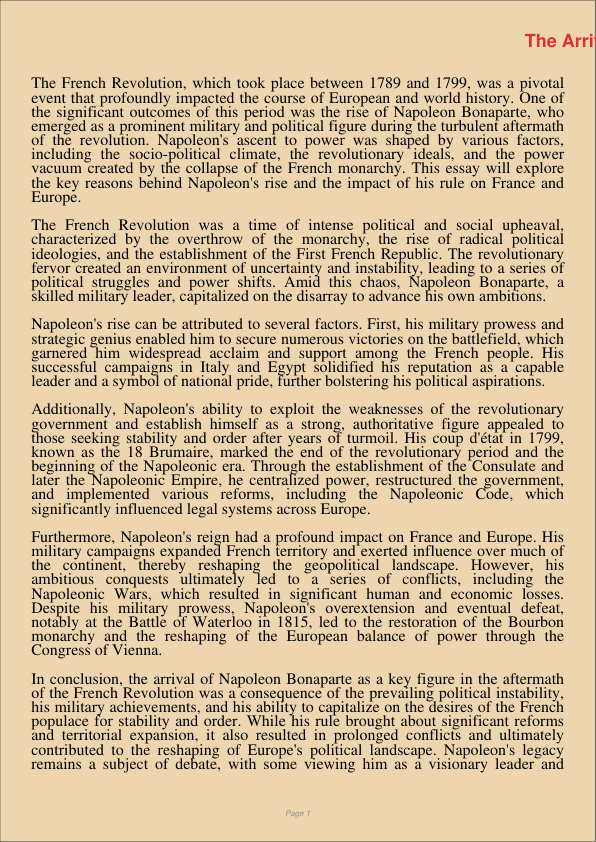The Arrival Of Napoleon Bonaparte As One Of The Results Of The French Revolution
Jan 7, 2024
napoleon bonaparte
french revolution
Education
Business

The French Revolution, which took place between 1789 and 1799, was a pivotal event that profoundly impacted the course of European and world history. One of the significant outcomes of this period was the rise of Napoleon Bonaparte, who emerged as a prominent military and political figure during the turbulent aftermath of the revolution. Napoleon’s ascent to power was shaped by various factors, including the socio-political climate, the revolutionary ideals, and the power vacuum created by the collapse of the French monarchy. This essay will explore the key reasons behind Napoleon’s rise and the impact of his rule on France and Europe.
The French Revolution was a time of intense political and social upheaval, characterized by the overthrow of the monarchy, the rise of radical political ideologies, and the establishment of the First French Republic. The revolutionary fervor created an environment of uncertainty and instability, leading to a series of political struggles and power shifts. Amid this chaos, Napoleon Bonaparte, a skilled military leader, capitalized on the disarray to advance his own ambitions.
Napoleon’s rise can be attributed to several factors. First, his military prowess and strategic genius enabled him to secure numerous victories on the battlefield, which garnered him widespread acclaim and support among the French people. His successful campaigns in Italy and Egypt solidified his reputation as a capable leader and a symbol of national pride, further bolstering his political aspirations.
Additionally, Napoleon’s ability to exploit the weaknesses of the revolutionary government and establish himself as a strong, authoritative figure appealed to those seeking stability and order after years of turmoil. His coup d’état in 1799, known as the 18 Brumaire, marked the end of the revolutionary period and the beginning of the Napoleonic era. Through the establishment of the Consulate and later the Napoleonic Empire, he centralized power, restructured the government, and implemented various reforms, including the Napoleonic Code, which significantly influenced legal systems across Europe.
Furthermore, Napoleon’s reign had a profound impact on France and Europe. His military campaigns expanded French territory and exerted influence over much of the continent, thereby reshaping the geopolitical landscape. However, his ambitious conquests ultimately led to a series of conflicts, including the Napoleonic Wars, which resulted in significant human and economic losses. Despite his military prowess, Napoleon’s overextension and eventual defeat, notably at the Battle of Waterloo in 1815, led to the restoration of the Bourbon monarchy and the reshaping of the European balance of power through the Congress of Vienna.
In conclusion, the arrival of Napoleon Bonaparte as a key figure in the aftermath of the French Revolution was a consequence of the prevailing political instability, his military achievements, and his ability to capitalize on the desires of the French populace for stability and order. While his rule brought about significant reforms and territorial expansion, it also resulted in prolonged conflicts and ultimately contributed to the reshaping of Europe’s political landscape. Napoleon’s legacy remains a subject of debate, with some viewing him as a visionary leader and others as an ambitious conqueror whose actions had far-reaching consequences for France and the rest of Europe.